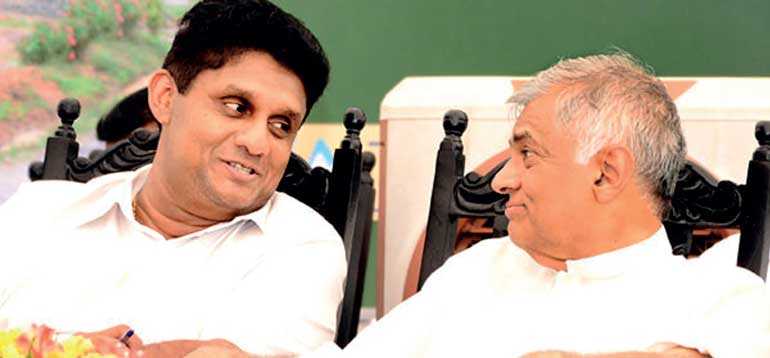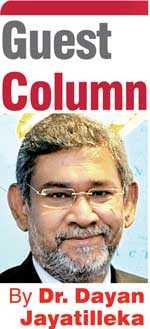Friday Feb 27, 2026
Friday Feb 27, 2026
Monday, 20 January 2020 01:12 - - {{hitsCtrl.values.hits}}

Sajith Premadasa with Ranil Wickremesinghe
The UNP is in decline not because it divided, but because its leadership is in a state of advanced deterioration and decay. The party has failed to replace or separate itself from the incubus of its hopelessly out of touch and durably unsuccessful Old Guard. If the UNP goes into the election without a dramatic gesture that can prove to the electorate that it has pivoted from the decadent dispensation exemplified and revealed by the RR tapes, it will be the fatal victim of a Cultural Revolution that makes the social backlash of 1956 seem child’s play.
Given the nationalist and populist tides in Sri Lanka as in most parts of the world today, if the UNP goes into the coming election with its current leader, or indeed with him in any visible, audible, symbolic or even token capacity, it will be crushed by the electorate, thereby endowing the incumbent administration with the two-thirds majority it explicitly and emphatically seeks. The resultant Constitutional transformations and changes of the electoral system that have been signalled; the power shift, hyper-centralisation, unilateralism and unipolarity that this steamroller majority will permit; will generate systemic contradictions, crisis and conflict along vertical and horizontal axes.
The immediate removal of Ranil Wickremesinghe as UNP Leader or the founding of a new pluralist- democratic political formation by the healthy, rational, progressive- reformist forces of the UNP, are the only two options by which to signal the end of and turn away from an era rejected by the vast majority of the majority. Such a rupture with the Ranil brand is the only way to avoid a wave of revulsion (sourced in the Bond Scam, the Geneva Resolution and the Ramanayaka tapes) which will decimate the mainstream democratic Opposition, ensuring a unipolar outcome with all the risks that entail and imbalance that will ensue
The bloodiest, most historically tragic cycles of violent conflict in Sri Lanka arose under two successive administrations which had nothing in common except one factor: they both enjoyed a two-thirds majority in Parliament. OK, make that two factors in common, because both administrations leveraged their two-thirds majorities for new Constitutions that remodelled the State, in one instance rewriting the Social Contract (1972). I refer to the centre-left administration of Madam Sirimavo Bandaranaike (1970-1977) and the centre-right administration of JR Jayewardene (1977-1987). 
The two-thirds majority made the political system so devoid of any balance, so hyper-centralised, so bereft of safety valves, that oceans of blood spewed out, cascaded. For a political analyst with a political science perspective, a parliamentary two-thirds majority signals the prospect that the system turns dangerously unipolar. For a student of international relations with some experience of diplomacy, unipolarity in a political order, international and/or national, inevitably results in the abandonment of multilateral dialogue, negotiation, consultation, and consensus-seeking, and its replacement instead, by hegemonistic unilateralism, exit from bilateral and multilateral accords and the unilateral rewriting of contracts, charters, rules and norms.
On both previous occasions in Sri Lanka a two-thirds majority in Parliament resulted from the backlash against a deeply unpopular opponent, the UNP administration of 1965-1970 and the SLFP administration of 1970-1977.
The immediate removal of Ranil Wickremesinghe as UNP leader or the founding of a new pluralist-democratic political formation by the healthy, rational, progressive-reformist forces of the UNP, are the only two options by which to signal the end of and turn away from an era rejected by the vast majority of the majority. Such a rupture with the Ranil brand is the only way to avoid a wave of revulsion (sourced in the Bond Scam, the Geneva Resolution and the Ramanayaka tapes) which will decimate the mainstream democratic Opposition, ensuring a unipolar outcome with all the risks that entail and imbalance that will ensue.
Ranil Wickremesinghe took over the UNP leadership in 1994. He got off to a halfway decent start, promising to be a social democrat, but in a few years, by 1997, he made three strategic decisions, major pivots, which actually prevented the UNP from doing what the SLFP and later the SLPP succeeded in doing to him and the UNP. The first shift was to abandon the ideological non-alignment and flexibility, indeed ambidexterity that the UNP had demonstrated for the most part throughout its history.
Instead he officially integrated the UNP with the global cartel of rightist and centre-right parties, the International Democratic Union, headed by the UK Conservatives and the US Republicans. Following from that decision came the second, which was the most disastrous. He embraced the Liam Fox agreement and completely changed the UNP’s stance on the LTTE.
Until that point, the UNP had attacked the Chandrika administration for its overly ambitious federalising package of 1995-1997, thereby benefiting from the growing nationalist opposition to that appeasement. Dr. Jayalath Jayawardena who had donated air raid sirens to the besieged Sinhala ‘border’ villages, led the cross-country caravan of vehicles carrying the body of Ven. Kithalagama Seelarathana thero, the revered Dimbulagala monk, murdered by the marauding LTTE terrorists.
Arguably the UNP could have won in 1999 or 2005 if it maintained this line. Instead, after the 1997-98 Liam Fox pivot, the UNP led by Wickremesinghe would be seen as the party of appeasement. This lasts up to this day with the co-sponsorship of the 2015 Geneva Resolution as the latest offense against patriotic sentiment.
The third of Ranil’s strategic errors of 1997 was to transform the UNP itself into a personal dictatorship while depriving it of its old Constitution that gave it a socially representative character and a strong mass base. This was symbolised by his marginalisation of Sirisena Cooray the exceedingly able General Secretary of the party. The slide from Sirisena Cooray to Akila Viraj Kariyawasam tells the story of the UNP’s organisational and electoral erosion.
Incredibly, Ranil Wickremesinghe has in 2020, just entered his fourth consecutive decade as UNP leader, a tenure which commenced in the 1990s. This is a world record in a democracy, and without any foundation in rationality. It is also unprecedented in any political setting given his conspicuous lack of success. The last time the UNP ever elected a leader of Sri Lanka it was in 1988, and that was Ranasinghe Premadasa.
In the decades that Ranil has led the party, it has never produced a President. When Ranil ran for that office in 1999 and 2005, he lost. He and the UNP have had to be satisfied with the consolation prize of Prime Ministerial office, but that too has been ephemeral. Strikingly, the electorate took almost 15 years before its re-elected Wickremesinghe as PM, after having first elected him to that post in 2001, so allergic was the public to his performance.
Wickremesinghe has proposed a Leadership Council, which means that instead of himself as leader, it will be him and two others. One of the names he has proposed, Karu Jayasuriya would have been an excellent choice in 1999, 2005, 2010 and 2015 as candidate. Today however, he is indelibly remembered as the Speaker who deprived the Sinhalese of even the post of the Leadership of the parliamentary Opposition, by turning down the arithmetically obvious claims of the Mahinda Rajapaksa led JO.
A more serious point is that the Sinhala Buddhist voter never buys religious piety or endorsement by the religious hierarchs as the sole political criteria. The 1965-1970 UNP administration of Dudley Senanayake overturned the calendar by instituting the Poya and pre-Poya holidays, but its pusillanimous stand on the Vietnam War, a conflict which mattered greatly to the Buddhist Sinhalese, contrasted sharply with Madam Bandaranaike’s robust support of the national liberation struggle of Vietnam. Furthermore, the conspicuous presence of a Sinhala literary figure IMRA Iriyagolla as the UNP’s Minister of Education did nothing to placate Sinhala sentiment as he was a reactionary and polarising figure.
The Sinhala Buddhists voter will want a leader who stands for national sovereignty, national independence, territorial integrity, unity, i.e. is politically a patriot.
Two arguments that have been presented against the immediate replacement of Wickremesinghe are especially unsound. The first is that Madam Bandaranaike led the SLFP for decades, which is true, but then again, she led the country, holding the topmost post in the System, the Prime Ministership, three times, unlike Wickremesinghe who has tried but never risen to the top or helped another UNPer to do so during his quarter century old leadership.
The second argument is that any leadership change should only take place after and not before the election. If the UNP goes into this election with a leader or a so-called Leadership Council (a diaphanous camouflage) that reminds the voter of everything from the Bond Scam to the Geneva Resolution and most recently the RR tapes that reveals the decadent putrefaction that has set into the party and UNP government’s subculture under Ranil Wickremesinghe, then it is setting itself up for the bloodless electoral equivalent of a massacre.
The general, conventional, commonplace argument that a split in the party would be deleterious, doesn’t compute. The UNP was confident that a split in the SLFP would ensure the latter’s defeat and the long-term incumbency of the UNP. On the contrary it was the split and the new formation that ensued, which enabled the then Opposition to rebrand and rally new, energetic social forces, scoring a string of victories starting with February 2018, and eventually drawing in the residual SLFP as a subordinate partner.
Political history, including that of the UNP proves the same point. DS Senanayake split the Ceylon National Congress and launched the UNP when the 1947 election was in sight. SJV Chelvanayakam split the Tamil Congress of the revered GG Ponnambalam. SWRD split from the UNP.
With the Bond scam, the February 2018 local government election debacle and the Easter shock, the UNP was in the worst electoral situation in its history. And yet, the nomination of Sajith Premadasa took place well after the SLPP’s strong nominee had done several laps around the racetrack. Of the 10 percentage points that separated the winner from the loser, surely a few must be attributed to that delay which ensured a significant lead for the frontrunner while handicapping the party’s own candidate, and a couple more points to the refusal of Wickremesinghe to follow the sterling example of JR Jayewardene in October 1988 and hand over totally to the new candidate, staying completely out of the picture, thereby allowing a besieged UNP to project a radically new profile.
The shocking fact that by these two means, the Presidential Election was virtually handed over on a platter to the UNP’s main challenger by the UNP leader himself, to the detriment of the UNP’s candidate, is in and of itself reason enough for the ouster of that leader and his ideology.
A leadership that is the problem (or the greater part of the problem) cannot be part of the solution. The minimum gesture required for the emergence of a strong pluralist-democratic and progressive Opposition is a dramatic, qualitative change in the UNP leadership or rebellious secession and a brand-new beginning. A failure to immediately implement either will disintegrate the Greens’ vote base. That may seem no great loss except that it will destroy the possibility of a viable democratic Opposition and a semblance of multipolar balance in the political order and system.
(The writer is most recently the author of ‘Counter-Containment of Unipolarity: Dialectical Realism as World Outlook’, in Russia in Global Affairs, Vol 17, No 4, Oct-Dec 2019, Moscow, and ‘The Great Gramsci: Imagining an Alt-Left Project’, in ‘On Public Imagination: A Political and Ethical Imperative’ eds Victor Faessel, Richard Falk and Michael Curtin, Routledge, Taylor and Francis, New York and London, 2020).